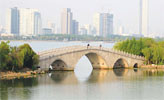Politics
Protests turn deadly on Israeli border; 8 dead
Updated: 2011-05-16 01:54
(Xinhua)
JERUSALEM - Eight people were reportedly killed and dozens of others were wounded on Sunday when Israel Defense Forces (IDF) troops opened fire on hundreds of demonstrators at two locations near Israel's northern borders with Syria and Lebanon.
Arab media reported that four were killed among the demonstrators attempting to break through the security fence along the military buffer zone between Israel and Syria. The Arab protesters approached the border fence as part of events commemorating the Nakba Day, an annual event marking the "catastrophe" of Israel's founding.
An IDF spokeswoman would not comment on the number of people who were killed or casualties incurred.
"An IDF force identified Syrian civilians attempting to damage the border fence in the northern Golan Heights," the spokeswoman said, "the troops fired shots in the air to deter the demonstrators."
Israeli Prime Minister Benjamin Netanyahu said in a televised statement on Sunday afternoon that he has asked the military to "operate with maximum restraint," but to block any attempt to breach the border.
Israel's Magen David Adom emergency medical services confirmed that its paramedics treated wounded in the incident.
Local media said that some 500 Syrian protesters managed to cross the border fence and enter the nearby Druze village of Majdal Shams, which is controlled by Israel. Eyewitness told Xinhua that the protesters succeeded to cross an area in which many landmines have been planted in the past.
An official with the United Nations Disengagement Observer Force (UNDOF), which serves as a liaison between the IDF and Syrian authorities and monitors the border area, said that most details of the incident are yet unclear.
"At this point we are trying to gather information on the incident," the official said shortly after the shooting.
Large IDF forces were deployed along the frontier in ongoing efforts to disperse the protesters and prevent them from crossing the fence. Periodic shooting is heard in the area, according to eyewitness reports.
Later on, the Druze leaders in Majdal Shams mediated with the IDF and the Red Cross to secure the safe return of activists to Syria.
Also on Sunday, four people were reportedly killed and five wounded in a mass protest rally that took place in Maroun a-Ras, a Lebanese village near the Israeli border.
Scores of pro-Palestinian demonstrators flowed into Maroun a-Ras, a village that saw intensive fighting between the IDF and Hezbollah during the 2006 war.
It is yet unclear who opened fire on the Lebanese rioters, thousands of whom approached the electrical fence that separates Israel and Lebanon.
According to conflicting reports, Lebanese troops fired in the air in a bid to prevent the demonstrators from approaching the border fence, ordering them to return to the village. The demonstrators resisted, pelting the troops with stones, local media reported, quoting eyewitnesses.
Israeli troops had also fired in the air, after nearly 50 protestors chanting "we want our land back," approached the fence and hurled stones at them.
An IDF spokesman would not comment on the incident.
The IDF significantly bolstered its presence in the area over the weekend in preparation for Sunday's rally. Earlier in the day, the army declared the border with Lebanon a closed military zone in order to keep Israeli Arabs from entering the area to demonstrate.
Israel were quick to lay responsibility for the incidents on its two northern neighbors. "The IDF sees the governments of Syria and Lebanon as responsible for any violence or provocation towards Israel that emanates from their respective territories," said an army press release.
Gershon Baskin, co-director of the Israel/Palestine Center for Research and Information, argued that the demonstrators were trying to deliver a message to the world that Palestinian refugees ' rights of return has been ignored.
As to the immediate impact of the shootings, local analysts downplayed the possibility of further large-scale clashes.
"(The incident) is still continuing, but I don't think it's an implication of major deterioration along the northern border," said Jonathan Spyer, a senior researcher at the Global Research in International Affairs Center in Herzliya.
Khaled Abu Toame, a Arab media advisor based in Jerusalem, agreed with the judgment. "But tensions are running high among the Arabs, both in the West Bank and in Israel, because they are tired of the failed peace negotiations.
"There is a feel that the gap is widening between Jews and Arabs. We are being looked down upon and feared as enemy," he said, "this is very dangerous for Israelis and Arabs alike."
E-paper

Green works
Wuxi becomes 'test case' for facing country's environmental challenges
The global rise of Chinese brands
China-EU trade on solid ground
ZTE banks on innovation
Specials

The song dynasty
There are MORE THAN 300 types of Chinese operas but two POPULAR varieties are major standouts

Cut above the rest
One of the world's oldest surgeons has performed more than 14,000 operations

From the ground up
Architect of Guangzhou Opera House has many projects under way, including 2012 Olympics.
